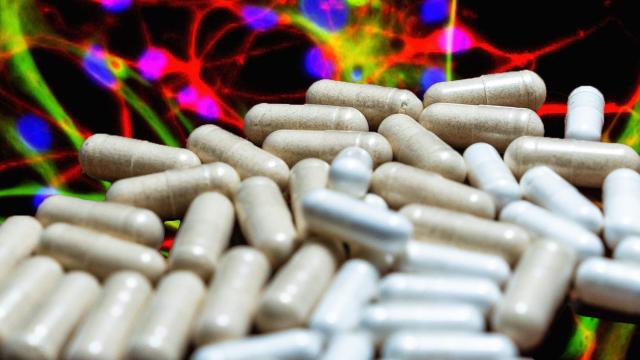Supplements that supposedly improve brain health and functioning, known as nootropics, often contain unapproved and potentially unsafe drugs, according to new research published Wednesday. The study not only detected drugs not approved in the U.S. in these nootropic products but also found that these drugs could be in much higher doses than labelled or in combinations that have never been tested in people.
Nootropics, also called smart drugs, have become one of the fastest-growing segments of the supplement industry. They’re marketed as products that can “enhance” the brain, promote creative thinking, and ward off cognitive decline and memory loss. As with many kinds of supplements, the actual evidence for nootropics is modest at best and sometimes non-existent, depending on the ingredient.
Another major problem with supplements, according to study author Pieter Cohen, is that they’re often sold with pharmaceutical-grade ingredients that have never been approved in the U.S. by the Food and Drug Administration or even undergone any clinical testing. According to his team’s latest study, published in the journal Neurology: Clinical Practice, nootropics are no exception there.
Cohen, a doctor and researcher at Harvard Medical School, and his team bought and tested 10 brands of nootropics that were said to contain omberacetam, aniracetam, phenylpiracetam, or oxiracetam. These drugs were chosen because they’re analogs, or close chemical cousins, of the drug piracetam, another claimed nootropic ingredient. Piracetam and some of these analogs have been approved as drugs for neurological problems like seizures or dementia in a few countries, but none are approved in the U.S. for any condition. Cohen and his team published a similar study last year specifically looking for piracetam (or noopept, as it’s also known) in nootropic supplements.
The first major red flag, Cohen said, is that these products were easily available at all. The law on what does and doesn’t count as a supplement in the U.S. is pretty lax, but trying to pass off lab-made ingredients that have been studied or approved as drugs in other countries is a glaring no-no, and the FDA has said as much. However, Cohen was able to find some of these supplements through a database set up by the National Institutes of Health, which came with no warning about their illegal status.
Beyond that, the brands tested routinely contained dosages of the drugs that were different than labelled (if the label even included dosage info, that is). In some brands, these dosages were up to four times higher than the dosage you would get from an approved version sold outside of the U.S. Other times, the supplement didn’t contain the listed drug at all or had other unapproved drugs that weren’t listed. In one brand, they found a whopping four nootropic drugs at once.
No drug comes without side effects. Some of the known side effects associated with these drugs include high blood pressure, insomnia, agitation, dependence, and even hospitalisation. But that’s using them as intended, in doses that have been deemed safe for people (in some countries). Once you’re upping the dose fourfold or mixing in other drugs, you’re entering uncharted territory.
“You’re talking about combining drugs that have never been in combinations tested in humans,” Cohen said. “So we have absolutely no idea what the adverse effects of that could be.”
The study’s findings are limited to these specific nootropic supplement brands, and it’s possible they may not be generalizable to all nootropics sold in the U.S. But this isn’t Cohen’s first time trying to bring attention to the largely unregulated world of supplements. In April, he published research showing that supplements marketed as alternatives to steroids with illegal ingredients were mislabeled or contained hidden drugs. So while nootropics may be the newest flavour to become popular in the billion-dollar supplement industry, the problems identified by Cohen and other researchers are systemic.
To their credit, the FDA spoke out last year about the dangers of nootropic supplements, and it has sent warning letters to companies selling supplements with these sorts of unapproved ingredients. But Cohen argues that more could be done by the regulatory agency, even within the constraints of the current weak regulations on supplements. Similarly, he added, the NIH could do more to warn people about supplements on its database.
In a more ideal world, Cohen has argued, the FDA would be given the power to create its own version of a supplement database, one that could keep consumers more informed about what they’re taking while also allowing the agency to go after companies that aren’t following the rules with more regulatory force. In the short term, though, he advises his patients not to take nootropics or other supplements that sound too good to be true.
“Basically, we need to avoid supplements that promise on the label they’re going to have immediate effects on our health. It’s one thing to take a multivitamin, with the understanding that it can keep a minimum amount of vitamins in your body. It’s another thing to turn to a supplement to either help you study better or work out, etc, because of the risk of them having active pharmaceuticals and in unpredictable dosages and unpredictable combinations,” Cohen said. “I do not recommend nootropics to my patients and I would definitely recommend against taking any supplement being sold as a brain booster until we can solve these serious regulatory problems.”
